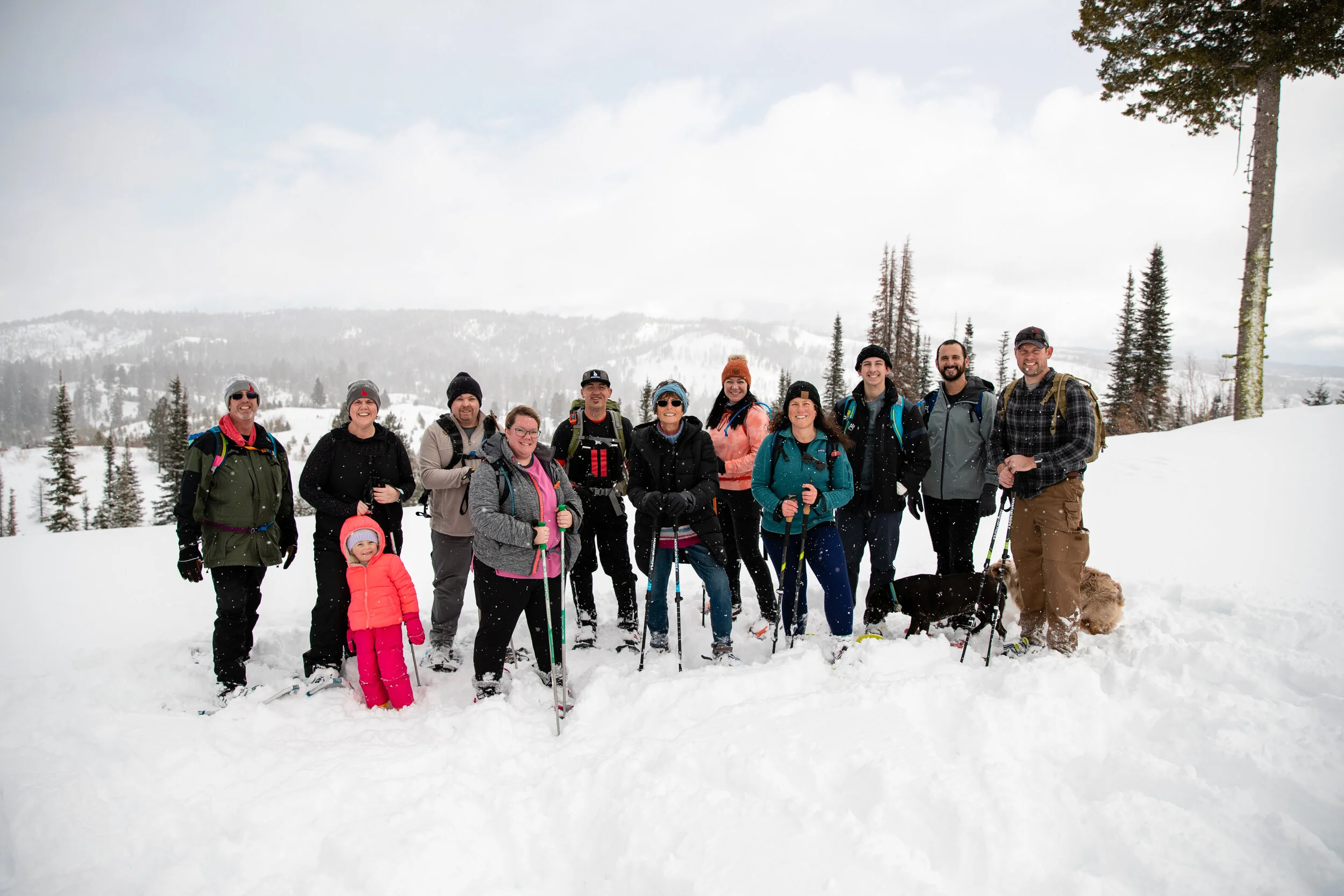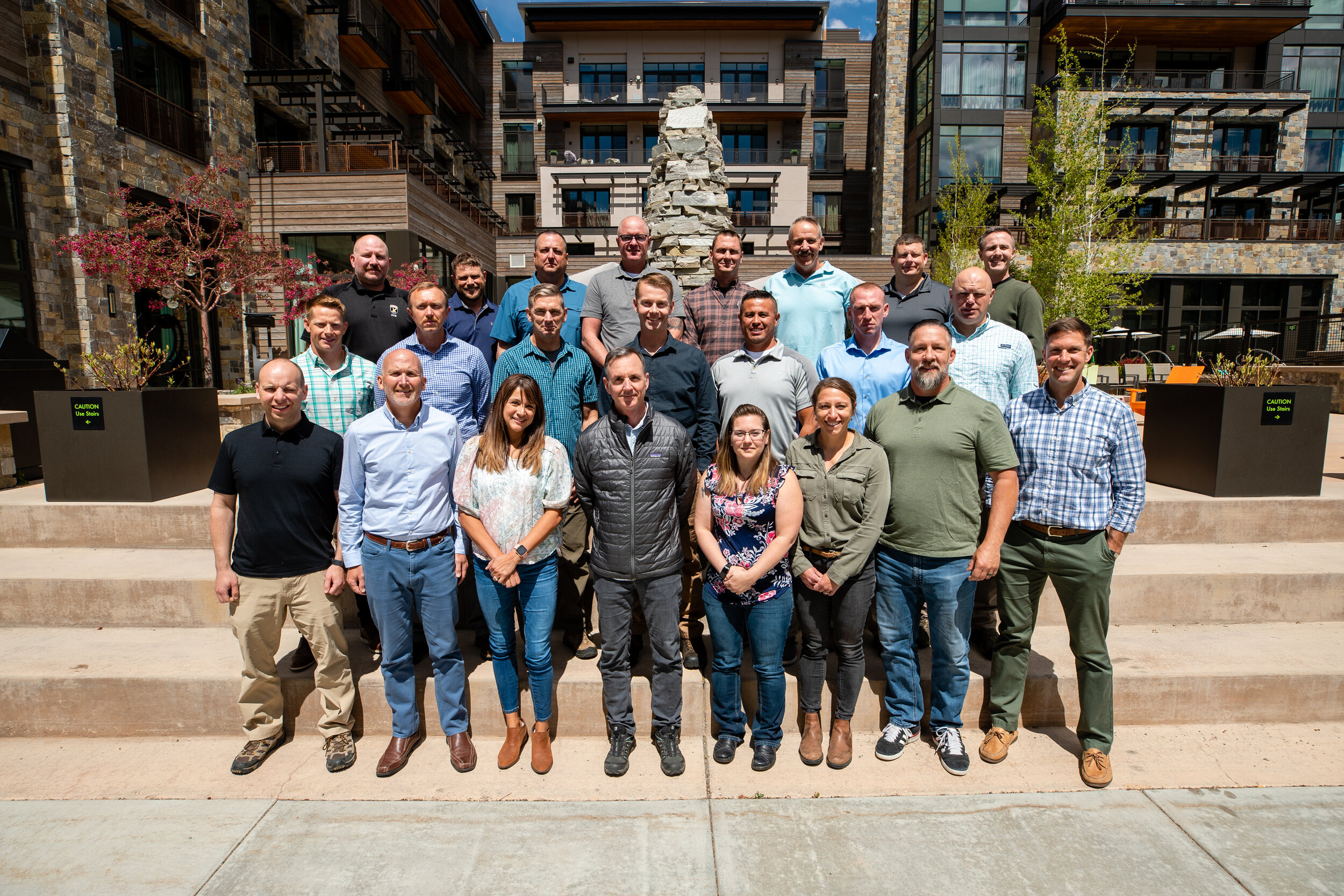Are you a transitioning military member, veteran, or military spouse interested in learning what it takes to make cybersecurity your next career? We sat down with 2 of Idaho’s top cybersecurity experts that made the transition from military to civilian cybersecurity professionals to find out more about steps to take to make yourself more marketable in this fast-paced, in-demand industry.
All Gold Star Children in Idaho Will Graduate College Debt Free
Mission43 has partnered with the Children of Fallen Patriots to ensure every Gold Star child in Idaho graduates college debt-free. The average gap to finish is $25,000, and our nation has an unwritten obligation to support and create opportunities for these children who have lost a parent in combat, training, and other duty-related accidents.
There are currently over 50 Gold Star children in Idaho. To support them, Children of Fallen Patriots will provide college scholarships and educational counseling which will be fully funded by Mission43. Even with the drawdown in combat operations, the responsibility will continue to exist and we are honored to play a part.
HOW TO HELP
If you know a Gold Star family, please share that Mission43 would like the opportunity to connect and help with the Gold Star children scholarship. Additionally, even though Mission43’s funding is directly allocated for Idahoans, the Children of Fallen Patriots is a national organization and all Gold Star children will be supported.
Learn more about the Children of Fallen Patriots here.
Connect to learn more about Mission43’s partnership with the Children of Fallen Patriots!
OTHER MISSION43 EDUCATION OPPORTUNITIES
The First Dirt Moving At The Site of Mission43’s New Headquarters
Idaho After The Military: Jet Boats in Hells Canyon
Owning a jet boat guide company is not the typical next career after the military, but we found someone who did it. Homer Brown returned to his hometown of Whitebird, Idaho after his time in the Army, and now he spends his days on the Snake River running rapids, catching sturgeon, and giving his customers a sense that they are part of his local community. To top it off, he’s also the town mayor.
Mission43 Volunteers Support Challenged Athletes Foundation in First Idaho Climbing Clinic
Photo Album: 9/11 Miles of Remembrance 2021
On September 11, 2021, Mission43 conducted the Miles of Remembrance 5k run, walk, ruck event at the Eagle Bike Park. This was an opportunity for members and their families to honor the significance of sacrifice and service! If you see your photo, download and share it on social media while tagging @Mission43!
Welcome Fall 2021 Entrepreneur Course Cohort
Welcome fall 2021 entrepreneur course cohort members!
The Mission43 Entrepreneur Course fall session has kicked off, supporting veterans, service members, and spouses in starting and growing their businesses.
Follow this incredibly talented group through their course journey, as they progress through the 12-session course, using Lean Startup Methodology to develop or refine their business models and move towards achieving sustainable business viability.
Entrepreneurs growing their business
Alex Lewis | Summit IV
Summit IV is a mobile IV therapy business located in Boise, ID. that focuses on athletic performance and recovery as well as immune support, hydration, and beauty @summitiv
Dave Barber | The Patriots Workshop
The Patriots Workshop is a Treasure Valley-based business that creates custom wood flags, gun cabinets, and other rustic wood gifts and furniture @patriotsworkshop
Devon Demery | Silver Peak Espresso
Silver Peak Espresso is a drive-thru coffee stand located in Smelterville, ID. @silverpeakespresso
Donald Young | Rattler Medical Solutions
Rattler Medical Solutions designs and develops tools and equipment to increase capabilities of medical providers in austere environments
Jaime Martinez | ONEIDNET
ONEIDNET’s oneShop application helps small businesses increase sales, audience, and geographic coverage with free marketing and advertising
Malcolm Brown | WELoLo Inc.
WELoLo Inc. is a platform that supports small businesses and the community, providing a method to “pay it forward” with intention @weloloapp
Matthew Densley | Project Zero
Project Zero’s BUZZ’D is a high-stim pre-workout supplement with patented ingredients and no crash @projectzerolabs
Ruth Kennedy | In-home Care of McCall
In-home Care of McCall offers personalized care in the comfort of your own home
Tim McKinley | Gertie’s Micro-Bakery
Gertie’s Micro-Bakery is a Treasure Valley business that offers micro greens and sourdough subscription delivered to your door @gertiesmicrobakery
Tyler Merryman | MoHo Welding Fabrication and Training
Located in Mountain Home, ID., MoHo Welding Fabrication and Training offers custom metal cabinets and training/certification in all processes @mohowelding
Entrepreneurs developing their business
Corey Tubbleville | Boise Veteran Deliveries
Eric Zimmerman | Indoor mountain bike park
Jeremy McLean | Indoor mountain bike park
John Moyle | Landscaping business solutions for young entrepreneurs
Kelly Canfield | Eco-friendly moving
Landon Stroebel | Cybersecurity software for utilities, infrastructure, and industrial control systems
Nicholas Emmerling | Cybersecurity consulting for small businesses
Nick Corisis | Backcountry off-road touring
Shaun Marriott | Tactical clothing for military and law enforcement
Steve Jedziniak | Butcher shop and specialty meats
Learn more about the Mission43 Entrepreneur Course
Contact the Mission43 education team directly to learn more about the Entrepreneur Course and other programs for military members, veterans, and spouses.
Photo Album: Happy Hour Twisted District Brewing 2021
Photo Album: Happy Hour Powderhaus Brewing 2021
Education FAQ: Air University Associate-to-Baccalaureate Cooperative
What is the Air Force’s Air University Associate-to-Baccalaureate Cooperative?
Earn your Bachelor’s degree in as few as 60 credits
The Air University Associate-to-Baccalaureate Cooperative, AU-ABC, is a partnership between Air University and civilian colleges and universities to provide accelerated pathways for airmen with Community College of the Air Force Associate of Applied Science degrees to earn a Bachelor’s.
Airmen can earn their Bachelor’s through the AU-ABC program during or after service if they have one or more CCAF degrees.
HOW IS THIS DIFFERENT THAN OTHER DEGREE PROGRAMS?
Transfer credits can be tricky, and not every college accepts all credits from prior schools attended. This is especially the case when transferring Associate of Applied Science degrees, which are typically career-focused, highly specialized, and technical in nature, to a Bachelor’s program. On average, students lose one full semester, or 13 credits, when transferring. Unfortunately, many colleges and universities are not in the business of making transferring easy. The fewer transfer credits they accept, the more time you spend completing your degree, and the more money that funnels through their system.
However, Air University has articulation agreements with partner universities that will accept all CCAF AAS credits. These universities agree to apply these credits to one or more programs, and not require more than 60 credits to complete a Bachelor’s degree.
This is a great way to shorten your time to degree completion and maximize your education benefits. A general, accelerated online program example is represented below:
CCAF
5 classes x 8 weeks = less than a year to complete.
*Take as many CLEP tests as possible to further reduce time to CCAF completion!
AU-ABC
60 credits = 20 classes
20 classes x 8 weeks = ~1.5 years with 2 classes at once
Total Time
~ 2.5 years
While this time frame depends on the program and school choice, one can generally expect classes to be around 6 to 8 weeks in length for accelerated online programs. The equation time frame would be similar for in-person classes, at 12-13 weeks, provided that the student takes a full course load. If a student transferred to a program outside of the AU-ABC network, they could expect a more traditional graduation timeline of 3.5-4 years.
Of course, every student is different, especially working/military adults, but it stands that taking advantage of the CCAF and AU-ABC can be beneficial for those seeking to earn a college degree while maximizing their education benefits.
NOT EVERY PROGRAM IS CREATED EQUAL
While Air University has partnered with 89 colleges and universities, it’s important to do your own research and look into each program offered. Ask yourself:
What is my end goal? You might want a degree to advance your military career or set yourself up for more opportunities after service, or this may be a personal goal. This could be the difference in needing to complete a program ASAP, or being able to take it at a slower pace.
What are employers looking for? If this is for civilian career advancement, you’ll want to consider what type of degree employers are looking for: Depending on what you want to do, you may be satisfied with a general business management or leadership degree. If you want to specialize, it’s good to take a look at some job postings that match your goals and explore degree requirements in that field.
What is your learning style? It’s no secret that online programs can be much more convenient for working adults, but not everyone thrives in fully-online programs. If you need more of a hands-on approach, consider well-established online programs that have an interactive curriculum, rather than giving you the weekly assignment and expecting you to learn the material on your own. Cohort models are exceptional when it comes to both flexibility and instructor involvement, or perhaps choosing a school that is near you can provide the online flexibility with accessible on-campus support, such as Veterans Upward Bound or other services.
PROGRAM OPTIONS
We’ve curated a top-notch list of regionally accredited Air University partners that reduce their price per credit hour to meet or beat the Tuition Assistance rate for active duty members. Degree pathways are dependent on CCAF degree.
Arizona State University: With ASU’s scholarship for active duty military and reserve, members will not be out of pocket for tuition expenses beyond Federal Tuition Assistance.
BAS in Operations Management
BAS in Health Sciences
BAS in Health Entrepreneurship and Innovation
*For specific degree information, reach out to the ASU admissions team using the scholarship link above.
Boise State University: Through the TA Promise program, eligible active duty, guard, and reserve members using Tuition Assistance (TA) receive a scholarship to reduce their price per credit hour to match TA.
Colorado Technical University
Dakota State University
Eastern Oregon University: Offers a scholarship to cover tuition that exceeds TA. For those taking 100 percent of their coursework online and who have served in the National Guard or Reserves on active duty since Sept. 11, 2001, EOU offers the Active Duty Scholarship to cover all remaining tuition after other benefits are applied. Active duty military members receive priority registration.
Embry-Riddle Aeronautical University
Fort Hays State University
Bachelor of General Studies
BS in Technology and Leadership
Georgia Military College
Grand Canyon University
Granite State College
Indiana Wesleyan University: Zero out-of-pocket costs for textbooks
McKendree University: Technology and lab fees waived
Minot State University: Tech fees waived
Missouri Western State University
Northern Arizona University
Northwestern State University of Louisiana
Old Dominion University
Purdue University Global: Purdue Global is on the quarter semester hour system, and reduces price per credit hour for actively serving military members by 55%, which is lower than the TA cap.
St. Joseph’s College New York
Syracuse University
University of Arizona
University of Charleston
University of North Dakota
University of Northwestern Ohio
FOR MORE INFORMATION ON CCAF AND AU-ABC PROGRAM OPTIONS, CONTACT OUR EDUCATION EXPERT TODAY!
Photo Album: Hiking Series Stargaze Point 2021
On June 19th, 2021, Mission43 conducted the Winter Hiking Series. The series entails some hikes suitable for the whole family, but “ramps up” in difficulty as it progresses. No experience is necessary, but some of the hikes are very challenging and require a certain level of fitness and commitment. Mission43 will provide the guide and gear, you provide the effort!
Photo Album: Hiking Series Stack Rock 2021
From June through August, Mission43 conducted five guided hikes in the beautiful mountains of Southern Idaho. The series entails some hikes suitable for the whole family, but “ramps up” in difficulty as it progresses. No experience is necessary, but some of the hikes are very challenging and require a certain level of fitness and commitment. Mission43 will provide the guide, you provide the effort!
Announcing Cohort III of the Mission43 Leaders Fellowship
We are proud to announce the following individuals have been selected to the third cohort of the Mission43 Leaders Fellowship. 22 veterans, military spouses, or currently serving military members who demonstrate exceptional leadership potential and actively seek personal and professional growth will take part in this year-long experience.
Zach Betts
Boise, ID. An Army helicopter pilot and graduate student at Boise State University.
Ben Gilbert
Caldwell, ID. A former Marine Corps engineer officer.
Casey Jones
Boise, ID. Former Navy nuclear machinist mate & Army infantry cavalry scout. Current senior parking & mobility planner Desman Parking.
Mike Majors
Nampa, ID. An Army National Guard engineer officer and current division director for Engineered Structures, Inc.
Jarrett Redman
Boise, ID. A former Army civil affairs officer.
Bruce Sims
Virginia. A Marine Corps officer, project manager at the Marine Corps Warfighting Center at Quantico & future Idaho resident.
Davin Strang
Boise, ID. A retired Navy salvage diver and current owner of Boise Wine Barrel Creations.
Chris Wilson
Boise, ID. A former Army infantryman and current fraud, waste and abuse program manager at PacificSource Health Plans.
Fred Dummar
Idaho Falls, ID. A retired Army Special Forces infantry officer.
Sean Hunter
Boise, ID. An engineer officer in the Army National Guard & director of community-based education outreach at Boise State University.
Justin Klitch
Coeur d’Alene, ID. A former Coast Guard boarding officer and current sergeant with the Idaho State Police.
Corey Mendenhall
Hayden Lake, ID. A retired Army aviation officer and current president of StanCraft Companies.
Johnny Reyes
Meridian, ID. An A-10 Thunderbolt II pilot and air liaison officer in the Air National Guard. Owner of R&R Roofing Solutions, and a pilot for American Airlines.
Shannon Smith
Boise, ID. The commander of the 124th Fighter Wing and A-10 Thunderbolt II pilot in the Air National Guard.
Eric Toms
Boise, ID. A former Marine Corps infantryman and current supervisory deputy U.S. Marshal for the U.S. Department of Justice.
Gus Engstrom
Boise, ID. A mechanical engineer and former Army mechanic.
Tim Jolicoeur
Meridian, ID. A former Marine Corps infantryman & current owner/operator of Nutrishop and Restore locations in the Treasure Valley.
Heather Lopez
Boise, ID. A former Army physical therapist and current PT.
Melinda Parks
Silverton, ID. A military spouse and the owner of an independent grocery store in Pullman.
Johnathan Salisbury
Boise, ID. A former Air Force explosive ordnance disposal technician and current patrol officer for the Meridian Police Department.
Angie Spaulding
Boise, ID. A military spouse and controller at the Amalgamated Sugar Company.
Jesse Van Patten
McCall, ID. A former tactical air control party Airman in the Air National Guard and current lineman with Idaho Power Company.
With a collective experience of 70 deployments, 87 military moves, and 312 years of military service, Cohort III will complete four development phases with the goals of growing their network and increasing their ability to positively impact that state of Idaho. Phases are designed to align with the core values of Lead, Learn, and Inspire.
“Whether you’re an Idaho native or you’ve spent the last 10 years away, the Mission43 Leaders Fellowship provides a path for past and present military members and their spouses to quickly integrate into the community and gain a deeper understanding of how they can drive the state forward,” said Mission43 Director Bryan Madden. “Local leadership programs for the military community are rare. What we have here is special.”
The cohort is made up of a wide range of professionals and, when compared to other military development programs across the country, the inclusion of military spouses is a differentiator for the Mission43 Leaders Fellowship.
“Spousal support is extremely important to our military personnel,” said Melinda Parks, a Silverton based military spouse and the owner of an independent grocery store in Pullman, Washington. “We help with the difficult transition back to civilian life after deployment and hold down the fort at home in the meantime. I hope that through my time in this program I gain a new perspective into ways I can help support veterans at home, in my community and the workforce.”
Learn more about the Mission43 Leaders Fellowship HERE.
Education Discovery: Paying For Flight School
Mission43’s Education Discovery Series: Aviation
In session 1 of Mission43’s Education Discovery Series: Aviation, we sat down with Shane McKenna, military instrument flight examiner and owner of Cloud Surfer Aviation in Boise, Idaho. Shane provides insight into using state education assistance benefits as a member of the Army National Guard, Part 61 and Part 141 flight schools, and the process to becoming a professional aviator.
Using State Education Assistance to Fund Flight Training
In Idaho, members of the Air and Army National Guard are eligible for state-funded education assistance, which can be used for education providers located in-state. While the GI Bill restricts flight school funding to Part 141 programs, state-funded education assistance allows members to attend Part 61 programs, provided that they are located in Idaho.
Air Guard members eligible for the State Tuition Assistance Program (STAP) can receive reimbursement for flight training up to $4000 per year.
Army Guard members eligible for the State Education Assistance Program (SEAP) can receive up to $5000 per year.
Part 141 vs. Part 61
Training standards for Part 141 and Part 61 flight schools are the same; both require the same standards of performance and knowledge when it comes to FAA tests. However, they are different in the style of teaching.
Part 141 flight training is more structured, with FAA approved curriculum and more stringent oversight on maintained aircraft. Because of this, the number of hours of required training is reduced. By maintaining the high standards of Part 141, you’re receiving curriculum-based flight training, and you know exactly where you are in the process every step of the way. The school will retain your flight records so your flight training is seamless.
Part 141 training requirements include:
Minimum of 35 hours flight time to earn your Private Pilot License
Minimum of 35 hours flight time to earn your Instrument Rating
Minimum of 190 hours to earn your Commercial Rating
If you are seeking a career in professional aviation and have the time to dedicate to a rigid training schedule, Part 141 may be a fit for you. GI Bill funding can ONLY be used toward Part 141 programs.
Part 61 flight training is more flexible and relaxed than Part 141. Instead of a curriculum-based flight school, students have more control over their training timeline because flight instructors are typically more willing to work around their schedules. This opens up options for part-time instruction for people with busy or irregular schedules. With a Part 61 program, the student keeps track of their flying hours in their personal log-book. So, if your training is erratic or you switch instructors mid-training, you may require extra flight hours to keep your skills current and each instructor must sign off on your previous check-flights.
Part 61 training requirements include:
Minimum of 40 hours of flight time for Private Pilot License
Minimum of 40 hours, plus at least 50 hours of cross country flight time for your Instrument Rating
Minimum of 250 hours for Commercial Rating
If you need a more flexible schedule or want to fly for personal reasons, Part 61 may be right for you.
Credentialing Assistance
The Military Credentialing Advancement Initiative (better known as COOL) can provide up to $4000 annually for courses and exams that lead to industry-recognized civilian credentials in an occupation of your choice, to include Airline Transport Pilot, Airplane Instrument Rating, Certified Flight Instrument Instructor Rating, and other aviation related ratings/certifications.
To learn more or apply, visit the links below:
Scholarships
If you are willing to put in the work, there are quite a few scholarship opportunities available, both to military-connected members and the greater public. This list is not comprehensive, but provides a great starting point.
AAERO Scholarship Program awards up to $2,500 for aspiring pilots who have not yet received their private pilot’s license.
Aircraft Owners and Pilots Association awards members up to $7,500 for training as a private, sport, or recreational pilot. If you are not an AOPA member, you can get a free 6-month student pilot membership.
Idaho Aviation Association has 4 different scholarships with varying requirements, to include three $3000 scholarships and one $1500 scholarship. Applicants can apply to only one of the available scholarships.
Leroy W. Homer Jr. Foundation awards one scholarship a year for people ages 16-23 pursuing professional flight instruction, not through a university, leading to certification as a private pilot. Scholarship applications open October 31st through January 31st.
Stripes to Bars is a volunteer-run 501(c)(3) non-profit organization that assists veterans in their transition to aviation careers. Stripes to Bars provides annual scholarships, nationwide, for fixed-wing and rotary aircraft. Application window is open each year from January 1st to May 15th.
The Ninety-Nines Amelia Earhart Memorial Scholarship Fund for female aviators offers five types of aviation scholarships, to include flight training and emergency maneuver training.
Women in Aviation: Women Military Aviators Dream Flight Scholarship up to $2,500 awarded to female aviators pursuing flight ratings at an accredited institution or FAA Part 141 approved flight school.
Contact Us
If you’re thinking about starting a career in aviation and want more information, contact a Mission43 education advisor today!
Education Discovery: Military to Commercial Pilot
Mission43’s Education Discovery Series: Aviation
Session 2 of Mission43’s Education Discovery Series: Aviation features Spencer Widman, Army National Guard C12 pilot and First Officer for American Airlines. Spencer shares his experience as a military aviator transitioning into commercial airlines employment.
Becoming a Commercial Airline Pilot
The process to become a commercial pilot is long, the barriers to entry (like cost) are high, but even though it takes a lot of work, the potential is unlimited.
In the previous session of Mission43’s Education Discovery Series: Aviation, we talked about the methods, flight hours, and financial commitment required at each step. To become a commercial airline pilot, at minimum, you’ll need to do the following:
Obtain a Class 1 or 2 medical certificate
Earn a Private Pilot Certificate
Earn the Instrument Rating
Obtain a Commercial Pilot Certificate
Become a Certified Flight Instructor
Add the Multi-Engine Rating
Earn a Airline Transport Pilot Certificate
When it comes to gaining employment with a legacy carrier, the amount and quality of your flying hours count! According to 2020 Bureau of Labor Statistics data, the median annual salary for airline and commercial pilots is $130,440. Airline pilots will usually start their careers as first officers, with pay increasing as they gain experience and seniority.
Pilot Shortage
Because of the pilot shortage, companies are getting creative with recruiting strategies. Many of the most recognizable carriers have cadet program partnerships that work with universities and flight schools, and offer financial assistance to Flight Instructors in affiliate programs.
American Airlines: Envoy Cadet Program
Delta: Propel Pilot Career Path Program
JetBlue: Gateway Select
*SkyWest: Pilot Pathway Program
*SkyWest is partnered with Silverhawk Aviation Academy and Treasure Valley Community College.
Contact us
If you’re thinking about starting a career in aviation and want more information, contact a Mission43 education advisor today!
Education Discovery: Using GI Bill Benefits at Silverhawk Aviation Academy
Mission43’s Education Discovery Series: Aviation
In Session 3 of Mission43’s Education Discovery Series: Aviation, we visit Silverhawk Aviation, a Part 141 flight school in Caldwell, Idaho. Alisha Sweeney, Director of Student Services, shares details about using GI Bill benefits for degree-seeking and vocational flight programs at Silverhawk.
Learn more and connect with the education pillar
Education Discovery: Veteran Student Flight School Experience
Mission43’s Education Discovery Series: Aviation
Session 4 of Mission43’s Education Discovery Series: Aviation features Chad Morris, prior enlisted Navy electronics technician and Assistant Chief Flight Instructor at Silverhawk Aviation. Chad provides insight into the veteran-student experience at Silverhawk.
Learn more and connect with the education pillar
Photo Album: Miles of Remembrance Memorial Day 2021
Photo Album: Happy Hour Portneuf Valley Brewing 2021
On May 28th, 2021, the Mission43 team was on-site at Portneuf Valley Brewing networking with local members, distributing packets for the next day’s Miles of Remembrance event. This was an opportunity to learn about career development resources offered by our Employment Team, advance your education through our Education Team, and connect with other like-minded veterans, military spouses, and civilian supporters who all believe there is more to accomplish after the service. We set the conditions, you create opportunities with those you meet!
Education FAQ: GI Bill
How do I apply for education benefits?
You can securely fill out your application for benefits online. Click here and scroll down to the green “find your education benefits form” button. You will need your social security number, military history, and education plan. The VA also asks for your direct deposit information so that allowances can be sent directly to your bank account.
When does the Gi Bill pay?
The VA pays your tuition and fees directly to the school, once enrollment has been verified. The Post 9/11 GI Bill also pays a housing allowance and book stipend directly to eligible students receiving benefits. Payments are issued at the beginning of the month for training that occurred during the previous month. For example, if you are enrolled in a program on September 1, the soonest you will be paid is October 1. If you have a class that ends on September 14, with another starting on September 18, you will receive a housing stipend from Sept 1-14, then for September 18-30. This is why your housing payments may not always look the same or be deposited at the same time.
For information on Montgomery GI Bill benefits, click here.
Will the Gi Bill pay for school online?
Yes! Whether you attend in person or online, the Post-9/11 GI Bill will still pay tuition, housing, and supply stipend. View current rates here.
Which Gi Bill do I qualify for?
You could be eligible for Post-9/11 education benefits if you served at least 90 days active duty, either continuous or interrupted, after September 10, 2001. To learn more about your eligibility for Post-9/11, Montgomery, or other VA education benefits, visit this link or contact the VA Education Help Desk at 1-888-442-4551.
You can be eligible for more than one education benefit, but can only receive payments from one program at a time. The maximum amount of VA education benefits you can receive is 48 months, with an exception if you are eligible to use Vocational Rehabilitation and Employment benefits first.
Can the Gi Bill be used by my spouse?
Yes! If you have transferred your benefits, or are eligible to. You may be able to transfer your Post-9/11 benefits if you are an active duty service member or in the Selected Reserve. All of these must be true:
You’ve completed at least 6 years of service on the date your request is approved, AND
You agree to add 4 more years of service, AND
The person getting benefits has enrolled in DEERS.
If you have already exited service, your benefits cannot be transferred.
Will the Gi Bill pay for a Master’s degree?
Yes! The Post-9/11 GI Bill can be used for undergraduate and graduate degrees, vocational/technical training, OJT and apprenticeships, flight training, and more.
Can the Gi Bill be extended?
Sometimes. There are certain circumstances that can extend your eligibility period if your GI Bill has an expiration date.
You may also qualify for an additional 9 months of tuition up to $30,000 if you are an eligible veteran or dependent in a high-demand STEM field through the Edith Norse Rogers STEM Scholarship.















































